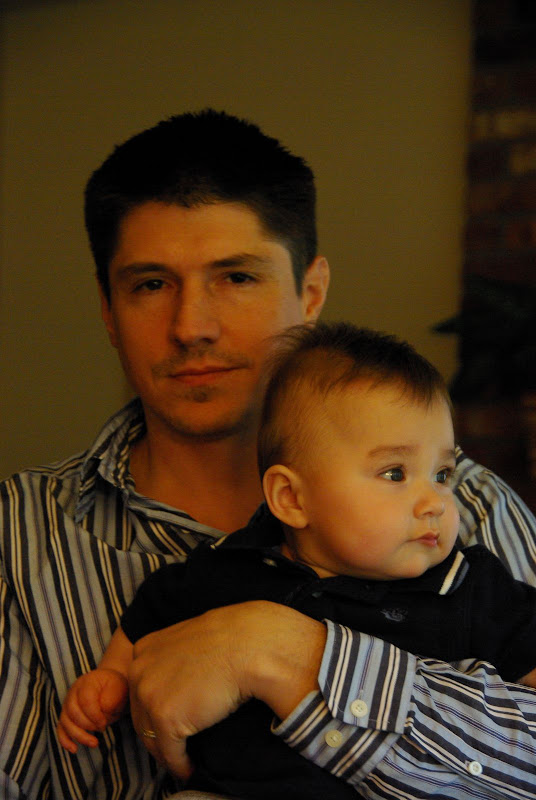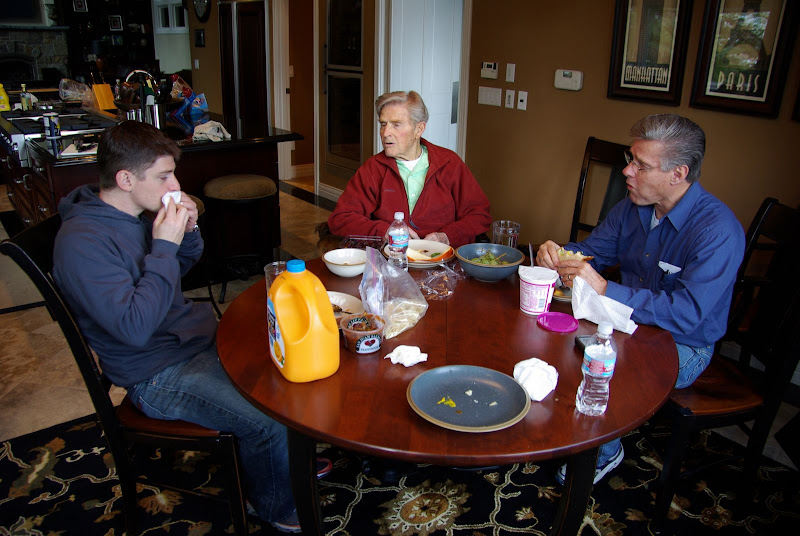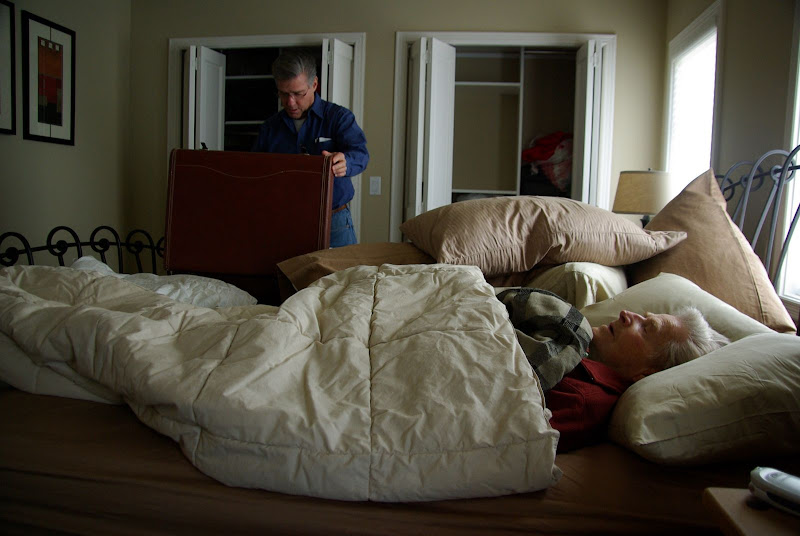Musings on theology, technology, family and whatever strikes my interest, from a onetime theologian and occasional CTO.
Sunday, April 27, 2008
Wallace Falls
New domain
Friday, April 25, 2008
Windows Defender: Potentially Unwanted Software
Over the last month, Windows Defender has popped up over 200 irritating dialog boxes on my computer, each one warning that I'm running "potentially unwanted software", i.e., Zango. (I actually walked through my Windows Defender logs to count.) And 200 separate times, I've told Defender that no, I actually do want to run Zango – and each day, Microsoft continues to show me the same intrusive warnings.

I haven't kept track of how many ads Zango has shown me during that same time period, but a typical user sees 2-3 ads a day, so let's call it 90 ads.
In other words, Windows Defender uses an intrusive, annoying dialog box to warn me at least twice for each ad that Zango might display. That's a very interesting trade-off.
I should also note that of those two applications (Zango and Windows Defender), only one of them passes detailed information about the applications I'm running on my computer back to the mother ship – and it's not Zango. That's a very interesting assessment about which application represents the greater threat.
In this light, it's been fascinating to read the recently released Microsoft Security Intelligence Report. Two tables in particular stand out in the detailed analysis.

Note where Zango and Hotbar show up (i.e., towards at the very bottom). In other words, 75% of users who are presented with the scary Windows Defender dialog box actually choose to ignore its recommendation, and choose to keep Zango's software. Since anyone presented with this dialog box actually has to select the non-default button ("Ignore"), that's pretty good news for Zango. It shows what we've been saying for years, that users do want our software.
The problem really comes with the next table.

If you add everything up, Microsoft has prompted users over 16 million times to uninstall Zango's software. Even though people follow through on only 25% of these warnings, this still means that Windows Defender has uninstalled Zango's software some 4 million times, in 2007 alone.
Now from Zango's perspective, this is at least as problematic as Microsoft's ongoing (and entirely legitimate) complaints about piracy. Both consist of other entities illegally infringing on a company's business and establishing a strong set of headwinds that make for a difficult environment in which to compete. Please note how this works. Users install Zango's software only after they affirm several times that they want it, after they're shown a clear, accurate, plain language description of what our software does, and after they click the non-default button on at least three dialog boxes. But after someone has gone through this clear and robust process, Windows Defender will automatically uninstall Zango if the user accidentally clicks the default button on just one scary dialog box that manages, somehow, to be uninformative and misleading at the same time. It's, umm, not precisely a level playing field.
But this is problematic from Microsoft's perspective as well. I think every technical person is by now well acquainted with the annoying-as-hell "User Account Control" feature in Vista. It's supposed to protect you from yourself by putting Yet-Another-The-World-Is-Ending dialog box in front of you every time you might do something dangerous. The Cry-Wolf problem, of course, is that this eventually becomes just another dialog box, one that you click through as automatically as you click the "Next" button while setting up a program. Microsoft admits as much:
In its current form, UAC will not stop really good attackers, or ones who have the help of really good attackers. If the bad guys can't think of any other way to defeat UAC, they will almost certainly resort to asking the user to do it for them. Given the choice of dancing pigs and security, we know from experience that the dancing pigs win every time. Users have learned to dismiss dialogs, and so they will until we manage to teach them otherwise. This results from many contributing factors, including the fact that there are too many warning dialogs, that the messages in them are useless, and that many of the manuals for whatever devices users buy include a note to "please click yes to the security warning dialog to dismiss it."
To the extent, then, that Microsoft continues to present users with pointless dialog boxes that they automatically close, or dismiss, or learn to ignore – dialog boxes that Microsoft knows users will automatically close, dismiss, and ignore – it's working against its own best interests and, indeed, those of the community in general. Microsoft's own data shows that users don't want these warnings – warnings that, in the case of Zango, serve no purpose, and protect users from no threat whatsoever, whether low, medium or otherwise. If Microsoft is really looking for an easy way to get rid of, oh, say, 16 million useless dialog boxes, I know a pretty good place to start.
Monday, April 21, 2008
Greek-Latin Audio
Sunday, April 20, 2008
Another Fistfight at the Church of the Holy Sepulchre
In the fight, a Greek priest was pushed to the ground and kicked, according to witnesses from both sides. Two Armenian worshippers were briefly detained by Israeli police. Scores of Armenian supporters staged a protest outside the police station during the questioning of the two, beating drums and chanting.This is not the first time. As Jesus said, "By this shall all men know that you are my disciples, that you love one another." He was right, you know.
Saturday, April 19, 2008
Living Stones
I attended part of a conference today on peacemaking in Palestine and Israel. The conference was held at University Presbyterian Church, in downtown Seattle, and was called "Standing with the Living Stones of Palestine and Israel." It was ostensibly about supporting Palestinian Christians in the face of an increasingly hostile world, though most of it (not surprisingly) turned out to be about pressuring Israel to end the occupation of the West Bank.
That's certainly a reasonable goal. As I've written elsewhere, it's indisputable that Israel has done a piss-poor job with the West Bank. They haven't had the political courage to make up their mind about what to do with the territories captures in 1967, and as a result, they've landed themselves in a strategic nightmare. Whether it's through their roadblocks, settlements, or just plain incompetent bureaucrats, the Israeli government continues to make Palestinian daily life miserable, and all but encourages the sort of stupid, evil, suicidal violence that makes Israeli daily life tenuous.
And there was truly a great deal to admire about the general message of the conference. Sami Awad, the director of the Holy Land Trust, spoke forcefully about Christ's words to "love your enemies." "This doesn't read like a suggestion," he said. "This is a command." He went on to talk about peacemaking being the way of the courageous. "It takes far more courage to stand in front of a tank and not move, than to shoot at it and run away." It was an impressive and challenging message. Putting aside for the moment the question of whether a Christian must be a pacifist, I certainly agree that violence (whether Israeli or Palestinian) is likely to solve little in this current conflict, and that emphasis must therefore be placed on nonviolent rather than coercive solutions.
At the same time, I'm not sure that I entirely agree with the typical "nonviolent" analysis of the situation. Certainly they are largely correct in pointing out the injustice of the Israeli government's actions in settling on Palestinian land, or by making it difficult for Arabs to get building permits, or any one of dozens of other issues. But not every aspect of the Israeli government's policies can be so easily categorized.
Here's an example of what I mean. One of the conference handouts was from ICAHD, the Israeli Committee Against House Demolitions. It consisted of a side-by-side analysis of the "Israeli/Zionist/Security" and "Peace and Human Rights" framings of the situation. The "Peace and Human Rights" column included these statements:
"Israel is not fighting for its existence. The Palestinians recognize Israeli sovereignty over 78% of the country."
"Palestinian violence is a symptom of oppression."
On the one hand, it certainly is true that absent Iran developing a nuclear weapon, Israel's existence is not exactly in question at the moment; and nobody can dispute that the more Israel cracks down, the more Palestinians want to engage in violence. But on the other, you can't deny that much, if not most, of the Arab world would even now prefer Israel's defeat, if not outright destruction. Israel has fought three existential wars in her 60 year history. Hamas' charter still calls for Israel's destruction. In addition, especially since the second Intifada, suicide bombings have given Israel a great deal of cause to crack down in the territories. This graph right here, for instance, taken from Ha'Aretz, shows the ratio of successful to unsuccessful attacks.

You can argue that Israel's harsh tactics are immoral or unjust or unhelpful in the long-term; but it's difficult to dispute that they've contributed to the growth of the yellow bars and the decrease in the size of the red ones.
But although I don't agree entirely with the narrative offered by the nonviolence movement, I don't fully agree with any other narrative I've heard either. I think the overall situation, when it comes right down to it, is too complex to be easily captured in any "narrative". You can only talk about individual situations and actions, and try to place the actions of each side in as broad a context as possible, before offering a judgment about the morality of a given situation or action.
This is why I'm not quite comfortable with the peacemaking movement as currently constituted: it fails to recognize that the actions of the poor and weak can be just as evil as the actions of the strong and victorious. I admire anyone who stands in front of tanks and denounces the IDF, but I would trust their analysis of the situation more if I knew that they also stood in front of rocket launching crews and denounced Hamas. Perhaps they do – but I've never seen it advertised.
I do think that it's helpful to outline the different narratives the warring parties tell themselves. But the most helpful approach is to assess the relative truth of the different narratives as they apply to individual situations, and to correct them impartially when they don't appear to be accurate. As a famous Jew once said, "You shall know the truth, and the truth shall set you free." A careful and objective analysis doesn't make for good soundbites, but it has other qualities which perhaps make up for this.
In this light, to my mind the most interesting speaker at the conference was Hank Landau, the now-retired founder of Landau Associates. He seemed to have very little interest in ideology or who was right and who was wrong. He just wanted people (whether Israeli or Palestinian) to have clean water, and he was willing to work with anybody who could help that happen. His talk on the geography and climate of Israel and Palestine was refreshing: just the facts, only as much judgment as was minimally required, and for that reason, oddly and surprisingly hopeful.
Sunday, April 13, 2008
Tiger Mountain
Saturday, April 12, 2008
Heybrook Lookout
I was walking through an Albertsons' parking lot this morning, on my way to Starbucks, when I felt an unfamiliar sensation. It took me a few seconds to realize what it was.
It was warmth.
The sun was out, the sky was reasonably blue, and for the first time this year, the air was warm with the promise of Spring.
So I went hiking. I had to go by myself, as Galena and Caedmon are in Denver for the weekend, visiting one of Galena's college friends. But it was beautiful and enjoyable nevertheless.
There was too much snow to get up to some of my favorite hikes (Rachel Lake, Deception Creek, Lake Serene, and so forth), so I tried out a hike near the town of Index up to Heybrook Lookout. It was fairly short (about a mile and a half up or so), but steep, and with reasonably nice scenery around. It was missing lakes and streams, two of my favorite things about the woods, and the trail finished by connecting with a Forest Service road, which is one of my pet peeves. Even so, it was good to be out again after a winter full of wet and sloth.
More here.
Sunday, April 6, 2008
Actively Parenting




 More.
More.
Saturday, April 5, 2008
Going Home


 I should note that my niece Kaity took this picture below:
I should note that my niece Kaity took this picture below:


Friday, April 4, 2008
The Promise of Future Revenue
Tuesday, April 1, 2008
Busted Out
We managed to get my grandfather out of Cascade Vista and up to Keith's place on Saturday. It might be a stretch to say that he's thriving there, but he seems to be doing well.

As you can imagine, a 95-year-old man with a broken ankle and a broken hip takes a fair amount of looking after. My Dad came up for an extended visit, and has been taking charge of his care for the last several days. He's heading back home today, but my cousin Amber will be up tomorrow.

Among other things, just keeping track of his appointments and schedule is a fair bit of work. He's got a doctor's visit tomorrow to remove the staples from his hip surgery, followed by a visit with an RN to check his Coumadin levels, and then several hours of physical and occupational therapy. He's a busy guy.

